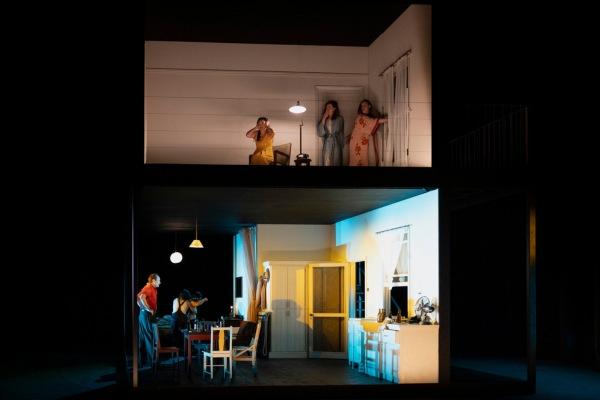Tennessee Williams wrote 'A Streetcar Named Desire' as a southern gothic tale, with the story of Blanche DuBois, her history and her mental fragility told as a haunting tragedy. The original drips with gin and it's sweaty and sticky and a little bit insane, like the city of New Orleans itself in the summer time.
As it was written, we are meant to begin with the character of a once beautiful, but now ageing and down on her luck Blanche arriving unexpectedly at her sister's and brother-in-law's cheap one bedroom flat. In need of a place to stay until she can make a plan for better living conditions, her demeanour upon arrival in the slightly dirty and seedy neighbourhood in New Orleans is almost regal at first, although she quickly begins to crumble and fray, disillusioned by the reality of her surroundings and her sister’s crass and brutal husband.
Melbourne Theatre Company’s 'Streetcar' brings us actor Nikki Shiels ('Sunday', T'he Picture Of Dorian Gray') stepping into the role of Blanche, one of the great roles of the stage.
Unfortunately, this updated portrayal of Blanche is far too assured and strong to be believable as easy prey to any man, so the dynamic, the nuance and the chemistry between her and Stanley Kowalski is skewed from the start. It is impossible to think of him as a menacing threat to her. Shiels presents Blanche as more of a boxer, punching away Stanley’s cruel insults, rather than a delicate magnolia who is stung and outraged by his behaviour. There is no gentle descent into madness as in the original production, and Blanche’s dialogue and the weaving of her own perfect fantasy life is all but lost here.

Image © Pia Johnson
Certainly it would be tough for any actor to equal Marlon Brando’s seething and misogynistic portrayal of Stanley Kowalski, but Mark Leonard Winter treats nearly all of his lines as punchlines and doesn’t dominate the scenes where he is meant to be brooding and forceful. There is no dangerous chemistry between him and Blanche, which is necessary for the entire play to work.
Shiels, although miscast here, is an excellent actor and her accent is spot on, whereas Stella, as portrayed by Michelle Lim Davidson, is seemingly born in some other geographic location altogether. Her duty and devotion to Blanche seem forced and unnatural. In what should be one of the great tragic scenes of this production, Davidson’s Stella breaks down and weeps so violently (literally, her body was rocking like she was doing crunches at the gym) that it completely distracts the audience from the scene that should belong to Shiels.
'A Streetcar Named Desire' is not meant to be slapstick comedy, but that’s how this plays out, as evidenced by the audience’s laughter in scenes that are meant for tears or at least heartfelt reflection on truths and fictions, and on desperate people leading desperate lives.
The stage and lighting are minimal, with a row of sparsely-furnished apartments, one upstairs and one downstairs that revolves from time to time. It probably could help with the telling of this tale if the soundscape incorporated some of the sounds of the French Quarter, or evoked some of the claustrophobia of living in the cramped quarters the main characters share. That atmosphere is largely lost on jokes about Blanche spending too much time in the bathroom.
It’s always a little dangerous to try and update a classic and beloved production – a tough task. Somehow this time, the essence of the tale is lost.
